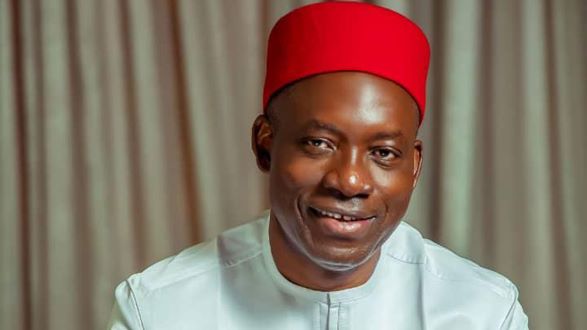By Jude Ndukwe
Recently, the Anambra State Governor, Prof Chukwuma Soludo through his Commissioner for Local Government, Chieftaincy and Community Affairs, Mr Tonycollins Nwabunwanne, announced the suspension of the Traditional Ruler of Neni Kingdom in Anaocha Local Government Area of the State, H.R.H Igwe Damian O. Ezeani.
The controversial suspension which has since divided public opinion in the state is also a subject of criticism of the governor as the suspension is considered by a section of the people as shocking, arbitrary, autocratic and highly demeaning of the traditional institution especially as it was predicated on the conferment of a befitting chieftaincy title on Senator Ifeanyi Ubah who was also mischievously referred to as ‘one Senator Ifeanyi Ubah’ by the government in its suspension letter to Igwe Ezeani.
In his reaction, the Obi of Onitsha, Igwe Nnaemeka Achebe, in his capacity as Chairman of Anambra State Traditional Rulers Council, ASTRC, expressed his strong reservations about what he described as the humiliating treatment meted out to Igwe Ezeani in particular and the traditional institution in general and described it as “the progressive dehumanisation and dismantling of the traditional institution in Anambra State by the present adminstration.”
For expressing his view, Soludo seems to want to take his pound of flesh from the foremost Igwe and has gone ahead to describe the ASTRC as illegal since, in his word, it was not constituted in accordance with the laws of the state guiding the composition of the Council, and in what is opined to be aimed at further humiliating the Obi of Onitsha, announced the dissolution of the ASTRC.
I have read one or two interventions by some analysts on this matter and cannot but shudder at how citizens enable tyranny in our little corners. In one of such commentaries, Soludo was hailed for using his powers to suspend the monarch and dissolve the traditional rulers’ council, saying the monarchs were appointees of the Governor who are subject to his whimsical and capricious exercise of such powers.
To justify his acclaim of Soludo’s arbitrary use of power as in this instance, the writer drew a comparison, among others, with the removal of the former Emir of Kano, Alhaji Sanusi Lamido Sanusi, by the then Governor of Kano State, Alhaji Abdullahi Umar Ganduje but failed, refused or deliberately neglected to state the processes that led to the removal of the Emirate’s 14th Emir even though, like it is in Anambra today, it bore the insignia of vindictiveness and vendetta.
Unlike Soludo who exercised his powers by fiat without giving the suspended Igwe Ezeani any chance for fair hearing, Ganduje was restrained enough to have first issued the deposed Emir a query to be answered in 48 hours but which Sanusi responded to in 24 hours. In fact, Sanusi’s removal was based on the recommendations of a Commission in Kano State.
Sadly, both Igwe of Onitsha and the former Emir of Kano became victims of their own virtues of fearlessness and forthrightness in speaking truth to power in defence of the helpless.
While one agrees that a governor has the powers to ‘hire and fire’ traditional rulers within his domain as the commentator puts it, it is the manner that power is exercised that stands one Governor out as a humane and listening Governor who has developed the needed capacity to endure the truth and act accordingly over another who acts like a power-drunk fellow. It is often said that power without control is nothing. With the way he has handled this matter, Soludo has given himself out once again as a Professor with ‘passing six but without passing sense.’
His pettiness becomes too obvious in the demeanjng way his government addressed Senator Ifeanyi Ubah as ‘one Senator…’ as if Ubah is one unknown personality in Anambra. The whole saga, apart from insulting the revered traditional institution in the state, was aimed at diminishing the Distinguished Senator representing Anambra South at the National Assembly. Since the rumours have filtered into town that Ubah might be interested in becoming the next governor of the state, and given his towering popularity and wide acceptance by the people especially given his performance at the Senate, it is possible that Ubah has emerged as Soludo’s mortal fear.
This is what Sigmund Freud, the Austrian neurologist and father of psychoanalysis, termed ‘castration anxiety ‘, metaphorically meaning the fear that comes with feeling insecure and helpless, and the need to act to keep one from being dominated, degraded or becoming insignificant even when such need is non-existent and only a figment of the imagination of the anxious. It makes the one with such irrational fear to react to the extreme against issues that are otherwise trivial and negligible just to save their pride thereby causing their anxiety to be damaging.
Soludo’s shabby treatment of the royal fathers is symptomatic of an underlying despotic and tyrannical characteristic that may unfold even further in due course. No matter how powerful one is as a governor, the way they treat monarchs says a lot about them. Leadership cannot be exercised indecorously and irrationally. Doing so is setting the society up for chaos. He should know better!
One wonders if Soludo have handled the matter differently and still achieve the same result? Yes, of course. But in order to prove a point at the expense of the revered traditional institution which he has ridiculed before the world, he threw caution to the wind and acted with emotions rather than with reason. He didn’t even bother taking advantage of the internal regulatory mechanism of the traditional rulers’ council. If he had not been in a hurry to wield the sledgehammer, his naked demonstration of disdain for those whom respect is due would have been avoided and he would have had no need backtracking on his rash actions.
That one has the power to ‘hire and fire’ does not mean that the person should be oppressive with it. Many institutions have been left to regret the arbitrary exercise of such powers when damages are sought against them according to law. Discretion is the better part of valour.
I wouldn’t know if the gods intervened in the case of Sanusi Lamido Sanusi and avenged for him by stopping Ganduje from being able to produce a successor which he desperately sought. Those who believe in the ability of the ancestors to fight to preserve the sacredness of the thrones they bequeathed to their descendants as custodians of our culture and tradition and intervene in their affairs may argue strongly in favour of that possibility since a traditional ruler is believed to stand in a place of spiritual significance among the people. If that happens to be the case, then the gods may not be blamed if Soludo’s further governorship ambition is cut short!
*Ndukwe sent this piece from Abuja via stjudendukwe@gmail.com


